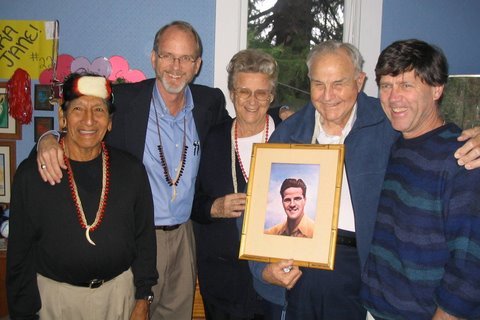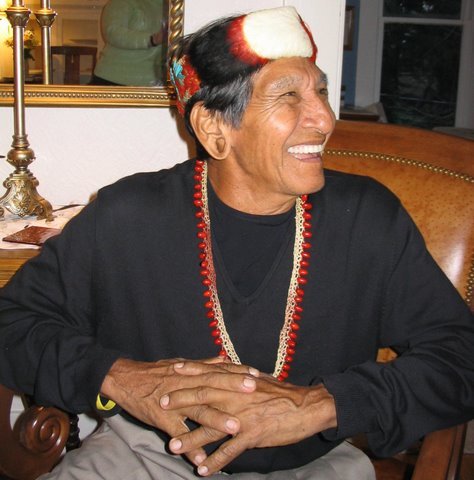Randy Alcorn's Blog, page 86
May 22, 2020
Trillia Newbell Shares a Lament for Ahmaud Arbery

I have the greatest appreciation for Trillia Newbell, the author of United: Captured by God’s Vision for Diversity. She is a delightful, godly, and wise woman, with a perspective that is needed in the church today.
One of the many things Trillia does is provide a commentary for the podcast The World and Everything in It. She recently shared some thoughts related to the murder of Ahmaud Arbery.
I am well aware that there is a great deal of polarization every time a young black man is shot and killed. There are those who always assume he was totally guilty and those who assume he was totally innocent. In cases where there is evidence that he has been guilty of something, the bigger question is, was he guilty of something which justified his being shot and killed? Please listen carefully to what Trillia has to say and ask God to speak to you through her. —Randy Alcorn
When news broke that a young black man was shot, my first instinct was to mourn. Not another one, I thought to myself. I decided to read as much as possible to gain understanding. And the more I learned, the greater the grief.
By this time, it’s likely we’ve all heard of Ahmaud Arbery. He was murdered while running through a Georgia neighborhood in February. As soon as a video of the shooting surfaced, it sparked an immediate public outcry. I was one of the many who ran in his honor on May 8th, which would have been his 26th birthday.
But not everyone was mourning. Plenty of people took to social media with hopes of tarnishing Arbery’s character. Images of someone who looked like Arbery walking into a construction site began to circulate. Then came discussion of a possible incident when he was 19 years old.
My hope for a society that could come together when the evidence was mounting against the assailants began to fade.
It doesn’t matter if he went into a construction site during his run. It doesn’t matter if we find out that he had anything, criminal or otherwise, in his past.
And even if there were a burglary involved, execution is inexcusable. Private citizens may not stalk, ambush, and kill someone. Arbery was unarmed and jogging—nothing warrants his tragic demise.
All of us who are pro-life understand just how precious life is. God created Ahmaud Arbery in His image. Whether Arbery knew Jesus or not doesn’t take away his value and worth. The color of Arbery’s skin doesn’t determine his significance. He is valuable because God created him.
We all know this. So, when I see an unarmed black man gunned down, my heart breaks. It breaks for his family, it breaks for our country, it breaks for the pending divide we will see over yet another story like this. It breaks because an image-bearer lost his life in an unspeakable way.
I’ve imagined what it would have been like if we all heard this story without knowing what these men looked like or where they were. How might the responses have changed?
Most of us would agree every life is valuable. Most of us would agree that no one should be forced to answer questions from strangers holding guns. Even if we disagree about the idea of citizen’s arrest, almost no one condones killing an unarmed man.
The trouble with these situations is that the moment we insert race—it becomes a divisive issue, rather than one we all mourn. But ethnicity does matter in these situations, because we are continuing to see unarmed black men die. There’s no excuse for it, and that’s why you see an outcry from the black community and beyond.
Our reaction isn’t an overreaction. It’s a desire to see unity, peace, love, and justice. Most of the calls I see from my African American brothers and sisters are calls for justice and lament. And that’s all any of us can hope for.
Justice is coming one way or the other—whether by the court of law or by the Lord Himself. One day every tear will be wiped away, but for now we mourn as we wait.
This commentary originally aired on The World and Everything in It podcast. © 2020, reprinted with permission. All rights reserved.
Related to this topic, I highly recommend Benjamin Watson’s thoughtful and well-written book Under Our Skin. (Much of what Benjamin writes about reminded me of what I learned in researching my novel Dominion.)
Photo by jerry klein on Unsplash
May 20, 2020
Why Don't We Often Focus on the Importance of Christ's Ascension?

Tomorrow, May 21, is Ascension Day. A reader asked me, “I hear talk about Christ’s death and resurrection, but seldom about his ascension. Why is that?”
The ascension was considered more important to earlier generations of Christians than it is today. Gotquestions.org explains:
According to one of the early church fathers, Augustine of Hippo, the Feast of Ascension originated with the Apostles. It may be one of the oldest feasts practiced by the Church, possibly going as far back as AD 68. There is no written evidence, however, of the church honoring Ascension Day until Augustine’s time in the fourth century. Churches around the world have observed Ascension Day Feasts for centuries…
It’s true the ascension is a neglected doctrine today, perhaps because we fail to explore the full implications of it. Steve Mathewson writes,
Forty days after Jesus’s resurrection, the biblical storyline takes a remarkable turn: Jesus disappears. “He was taken up before their very eyes,” Luke tells us, “and a cloud hid him from their sight” (Acts 1:9). Two angels then tell the disciples that Jesus was “taken into heaven” (Acts 1:11)
So what do we make of this plot twist in the Bible’s story? How should we understand our crucified and risen Lord’s ascension? Michael Horton observes that we typically “treat the ascension as little more than a dazzling exclamation point for the resurrection rather than as a new event in its own right.”
Yet the ascension is a vital part of the redemption story. If we simply collapse the ascension into the resurrection, we miss stunning benefits tied directly to Jesus being taken into heaven.
(See the rest of Steve’s article 5 Ways the Ascension Benefits You.)
Nate Palmer says this: “Without an ascended Christ, there is no High Priest ruling and reigning over all creation, our assurance of heaven is in serious doubt, and we would not be living temples in which God’s Spirit resides helping us understand the things of God. In short, without an Ascension every book past John wouldn’t exist and our union with Christ stops at an earthly resurrection.”
One remarkable thing about the ascension is that it affirms Christ’s physical body went into Heaven following His resurrection. This is what the creeds call His “self-same body,” stating that likewise our self-same bodies will be restored in our resurrection. Some Christians imagine that Christ shed Himself of His humanity and returned to being a completely spiritual being when He went back to Heaven. But this is false. The ascension creates a paradigm shift. The truth is not that Jesus became a baby at Christmas, and then 33 years later came the resurrection and ascension and then He stopped being a man. The resurrection demonstrates the incarnation is not temporary. But still it could be wondered if having defeated death in the resurrection, when it came time to going back to Heaven, Christ might have said, “Time’s up, no sense in being a man any more” and shed Himself of a body and retake the form (or lack of form) inherent in being the second member of the trinity.
He could have “dissolved” or “disappeared,” but instead He physically ascended to a place, from which He will physically return to earth in the same physical body. So Jesus became a man (first coming, incarnation), defeated death and assumed His eternal body as a man (resurrection), and went back to Heaven as a man (ascension) and will return as a man (second coming; and as our firstfruits raising our self-same bodies as bodies like His). He will reign over the New Earth as the God-man. He has become a permanent member of the human race.
So if you’re ever wished you could walk the earth with Jesus, like His disciples did, good news...if you know Him, you will. You will have a new (raised) body and it will be a New (raised) Earth, but it will really be you, it will really be Jesus, and it will really be Earth. No sin, no death, no curse. I will be me without all the bad parts, and the Earth will be Earth without all the bad parts. (New bodies are not non-bodies, and new earth is not non-earth, any more than a new car is a non-car.)
As Job put it, “I know that my Redeemer lives, and that in the end he will stand upon the earth. And after my skin has been destroyed, yet in my flesh I will see God; I myself will see him with my own eyes—I, and not another. How my heart yearns within me!” (Job 19:25-27)
So the second member of the triune God will be a human being for all eternity, and we will know Him not only as God, but as man. To not only worship God, but to see God, run alongside God, eat with God, swim with God, play catch with God.... Now, that is about as stunning a truth as there is. This is not “over-familiarizing” God. Had we come up with this idea, it would be blasphemy. The incarnation, resurrection and ascension was HIS idea, not ours. I for one wouldn’t have thought of it in a million years. But I’ll still be thanking Him for it in a million years, and I suspect I’ll be even more amazed about it then than I am now.
Here are some more quotes worth contemplating on the importance of the ascension:
He ascended as a conqueror, in a way of triumph. —Thomas Watson
The Lord, by his ascension into heaven, has opened up the access to the heavenly kingdom, which Adam had shut. For having entered it in our flesh, as it were in our name, it follows…that we are in a manner seated in heavenly places, not entertaining a mere hope of heaven, but possessing it in our covenantal Head. —John Calvin
At the ascension, Jesus leaves the space-time continuum and passes into the presence of the Father. He is still human, still our second Adam…and still our Advocate—yet now he has been so glorified that everything he does has a cosmic scope…any time-space limitation passes away. —Timothy Keller
The ascension of Jesus into heaven is designed to teach us that heaven does exist as a place in the space-time universe. —Wayne Grudem
The ascension of Christ is his liberation from all restriction of time and space. It does not represent his removal from the earth, but his constant presence everywhere on earth. —William Temple
What the ascension means is that Jesus Christ forever remains the Christ who is Jesus. He did not revert back to intangibility…The Incarnation is a miracle with no expiration date. —Jared C. Wilson
The Ascension was from one standpoint the restoration of the glory that the Son had before the Incarnation, from another the glorifying of human nature in a way that had never happened before, and from a third the start of a reign that had not previously been exercised in this form. —J.I. Packer
[As the ascended king] He controls all things for the church, and therefore you can face the world with peace in your heart…The man who died for you is not only at the right hand of the divine throne but he’s there as the Executive Director of history, directing everything for the benefit of the church. —Timothy Keller
May 18, 2020
In Challenging Times, Seek Your Satisfaction in God and His Word

Flight crews routinely announce, “If you’re traveling with a child or someone who requires assistance, in the case of an emergency, secure your own oxygen mask first before helping the other person.” Those instructions may sound selfish, just as it sounds selfish to say that one of our main duties in life is to find happiness, satisfaction, peace, and rest in God. But only when we’re delighting in our Lord do we have far more to offer everyone else—especially in times of stress and difficulty, when life demands even more of us.
Consider the example of George Müller, who immersed himself in the care of thousands of orphans in the 1800s, and suffered from bad health and the weight of stressful responsibilities. One day he wrote in his journal, “This morning I greatly dishonored the Lord by irritability manifested toward my dear wife.” He said he fell “on my knees before God, praising him for having given me such a wife.”
Müller didn’t excuse his irritability. He knew his unhappiness and bad mood had displeased God and hurt his wife. He owned up to it.
But George Müller couldn’t eliminate stress or occasional bad health. So what was his solution? He wrote,
I saw more clearly than ever that the first great and primary business to which I ought to attend every day was, to have my soul happy in the Lord. The first thing to be concerned about was, not how much I might serve the Lord, but how I might get my soul into a happy state, and how my inner man might be nourished. . . . I saw that the most important thing I had to do was to give myself to the reading of the Word of God, and to meditation on it.
He put into practice what Psalm 90:14 says: “Satisfy us in the morning with your loyal love! Then we will shout for joy and be happy all our days!” (NET). On another occasion Müller said, “In what way shall we attain to this settled happiness of soul? How shall we learn to enjoy God? . . . This happiness is to be obtained through the study of the holy Scriptures.”
We may not always recognize it, but we long for God and for His Word, that truth which is an extension of Himself, that clarifies and explains and shows us life as it really is, not as it is constantly misperceived. The world, with its sin and shallowness, leaves a sour taste in our mouths, but there is an eternal sweetness and delight to God’s Word. After we’ve spent enough time there, we’ll find that television and social media and news sites and popular culture will only leave us hungry and unsatisfied.
In his excellent article, Brett McCracken argues that just as fats/sugars/oils fall in the “use sparingly” category of the food pyramid, so too the internet and social media should not make up the bulk of our mental “diet.” In fact, I believe that sometimes it is just toxic, and those who eat a toxic diet will not be spiritually healthy. This is why we see Christians on social media who appear to imagine they are representing Jesus, while they fail to realize everyone else is shaking their heads at their constant launching of verbal grenades and stating their own biased opinions and conspiracy theories as if they were facts. In my opinion, it’s nearly impossible for perpetually unhappy and critical people to share the “good news of happiness” (Isaiah 52:7) effectively.
Puritan Jeremiah Burroughs (1600–1646) spoke about the futility of finding happiness in anything other than God: “That is just as if a man were hungry, and to satisfy his craving stomach he should gape and hold open his mouth to take in the wind, and then should think that the reason why he is not satisfied is because he has not got enough of the wind; no, the reason is because the thing is not suitable to a craving stomach.”
That’s why we’re to develop a taste for God’s Word, for it is as desirable and essential for us as milk is for a baby’s growth: “Like newborn babies, crave pure spiritual milk, so that by it you may grow up in your salvation, now that you have tasted that the Lord is good” (1 Peter 2:2).
Like eating good food and exercising regularly, if we develop the holy habit of daily meditating on Scripture, we will deeply appreciate it, realize our need for it, and miss it acutely whenever we’re away from it too long. And we’ll understand that only God can satisfy and sustain us in every season of life.
Related to this topic, our friend and EPM board member Robin Green recently sent me this note. It’s a reminder of the ever fresh, perspective-giving power of God’s Word:
This morning I was reading in Exodus 32, how Moses is on the mountain with God, receiving the law. Meanwhile, the Israelites are making a golden calf and worshiping it and sacrificing to it and saying it is the god who brought them up out of Egypt. And God is angry and says He will consume them. But Moses implores the Lord and reminds Him of His covenant and all. “And the LORD relented from the disaster that he had spoken of bringing on his people.” Of course, when he gets down from the mountain, Moses throws a fit and is furious with the people. And Aaron says he threw the gold into the fire and “out came this calf.” It’s ridiculous!
For some reason, this passage spoke to me about our sin, the sin of our nation, the sin of our world in turning away from God and ignoring Him and wishing to go our own way. And I was moved to pray that the Lord would relent from the disaster that is on us… not just the virus, but the crazy politics of our day, the division, the hatred, the flying after foolish answers to serious problems, the idolatry of wealth and health and youth.
I just wanted to say that God’s Word speaks to us each time we read it. No matter how many times it is read, it still speaks freshly to each day. I find that amazing. Of course Exodus 32 isn’t speaking directly about the pandemic of 2020. But God takes His word and reminds us that we are but dust, just as the Israelites in the desert were dust. We are wayward, just as they were. And He has a way out, which He graciously provided through Jesus. It’s amazing.
“How sweet are thy words to my taste! Yes, sweeter than honey to my mouth!” (Psalm 119:103, NIV)
“My soul is consumed with longing for your laws at all times.” (Psalm 119:20, NIV)
“I open my mouth and pant, longing for your commands.” (Psalm 119: 131, NIV)
“You satisfy me more than the richest feast. I will praise you with songs of joy.” (Psalm 63:5, NLT)
Browse more resources on the topic of happiness, and see Randy’s related books, including Happiness and Does God Want Us to Be Happy?
Photo by Kelly Sikkema on Unsplash
May 15, 2020
Suffering, Sovereignty, and the Coronavirus Crisis

Three weeks ago I did a 45-minute video chat with my friend Scott Lindsay of Faithlife, the makers of Logos Bible Software. We discussed suffering, God’s sovereignty, and the coronavirus crisis, and also talked about the good things that God is doing through this time.
Scott opened up some time for Q&A, and those watching sent in some great questions, including:
- How do you best bring up the reality of eternity to someone who is not saved in the midst of this pandemic?
- Is it helpful to talk about the end times in those conversations?
- What encouragement is there for church leaders during this time?
Hope you find this helpful!
If you’d like to read more about God’s sovereignty and meaningful human choice, see my book hand in Hand. For the problem of evil and suffering, see my big book If God Is Good, and these smaller spinoffs, including the devotional 90 Days of God’s Goodness, The Goodness of God, and the booklet If God Is God, Why Do We Hurt?
May 13, 2020
Ravi Zacharias and Hugh Ross Answer Questions from Non-Believers

I listened to this video with a recording of Ravi Zacharias and astronomer Hugh Ross, who were guests on Ohio State University’s radio program. It was recorded in 1994, but what both of them have to share and how they answer questions from callers, many of them antagonistic toward Christianity, is timeless. Ravi and Hugh discussed supposed contradictions in Scripture, other religions, denominations in Christianity, and morality. It’s a pretty extraordinary logical response to hostile questions, and I think you’ll find it helpful as you talk with others about your faith.
Several months ago Ravi announced he had been diagnosed with cancer and was undergoing surgery and treatment. His daughter, Sarah, posted an update last Friday sharing that the cancer is rare in its aggression and there are no further options to treat it. She wrote,
We know that God has purposed and numbered each of our days, and only He knows how many more Ravi will experience on this earth. One day, likely sooner than later, we will be serving without our beloved founder, though I know his love and legacy will convict and inspire us to service of his Lord even greater than we have seen before. While we are full of so many emotions, we are also at peace, resting in the truth that God knows all and sees all and is sovereign and good. I think of the great joy my dad will have and I am comforted.
 I have especially fond memories not of Ravi’s brilliance and apologetic prowess, great as those are, but of something that happened in 2001 when Ravi and I were headed opposite directions for media interviews at the annual Christian booksellers event, where we had talked various times over the years. Ravi was scheduled tightly and was with a publisher’s rep, who understandably wanted him not to stop. But in keeping with who he is, he stopped anyway. I introduced him to my daughter Angela. (This was the release of our book The Ishbane Conspiracy, which we wrote with her sister Karina, who had gotten married the week before and of course chose a honeymoon over a book event!).
I have especially fond memories not of Ravi’s brilliance and apologetic prowess, great as those are, but of something that happened in 2001 when Ravi and I were headed opposite directions for media interviews at the annual Christian booksellers event, where we had talked various times over the years. Ravi was scheduled tightly and was with a publisher’s rep, who understandably wanted him not to stop. But in keeping with who he is, he stopped anyway. I introduced him to my daughter Angela. (This was the release of our book The Ishbane Conspiracy, which we wrote with her sister Karina, who had gotten married the week before and of course chose a honeymoon over a book event!).
Ravi was very warm to Angela and asked her questions about herself, college, and her upcoming wedding (the girls were married seven weeks apart), despite the fact that he needed to be somewhere else. That, in my experience, is Ravi, a brother who has spoken to millions of people but makes everyone he talks with feel like they are the only one around.
I’m grateful for Ravi’s life and legacy, especially through his books. I highly recommend these:
Jesus Among Other Gods: The Absolute Claims of the Christian Message
Jesus Among Secular Gods: The Countercultural Claims of Christ
The Logic of God: 52 Christian Essentials for the Heart and Mind
The End of Reason: A Response to the New Atheists
I also recommend The Harvest Handbook of Apologetics, which is a great resource with chapters from many different Christian apologists and Bible scholars, including Ravi (I contributed a chapter on “Is It Reasonable to Believe in Heaven and Hell?”).
Ravi recently shared these words from Richard Baxter, the great Puritan pastor:
“Lord, it belongs not to my care
Whether I die or live;
To love and serve Thee is my share,
And this Thy grace must give.
If life be long, I will be glad,
That I may long obey;
If short, yet why should I be sad
To welcome endless day?
Christ leads me through no darker rooms
Than He went through before;
He that unto God’s kingdom comes
Must enter by this door.
Come, Lord, when grace hath made me meet
Thy blessed face to see;
For if Thy work on earth be sweet
What will Thy glory be!
Then I shall end my sad complaints
And weary sinful days,
And join with the triumphant saints
That sing my Savior’s praise.
My knowledge of that life is small,
The eye of faith is dim;
But ‘tis enough that Christ knows all,
And I shall be with Him.”
—Richard Baxter (1615-1691), “Lord, It Belongs Not to My Care”
Photo by Ilyass SEDDOUG on Unsplash
May 11, 2020
Keith Getty on What We and Our Children Sing About Matters

I met Keith and Kristyn Getty at a worship conference I spoke at many years ago. When they sang their recently composed (with Stuart Townsend) song “In Christ Alone,” my heart soared in worship, and I came home and told people, “You’ve got to hear this song!” Here’s a short bio:
Irish singer/songwriters and recording artists Keith and Kristyn Getty are among the preeminent modern hymn composers of this generation. They’re best known for “In Christ Alone,” along with the popular U.S. recording, Awaken The Dawn and Joy – An Irish Christmas. The couple’s music has been shared at the GMA Dove Awards, Franklin Graham Crusades, The Third Lausanne Conference on World Evangelization, and with television performances for Public Television and BBC.
I recently watched part of an interview that Keith did where he challenges pastors, worship leaders, and parents to think carefully about what songs we’re giving our children to sing. What he has to say is great and important:
I appreciated Keith’s comments about helping children be deep, serious, and intelligent believers, and leading them to have big thoughts about God. Encouraging biblical literacy in our homes and churches is a huge piece of that, but certainly worship and singing also play a vital role in helping children develop a heart for God.
The Gettys have been doing a weekly family hymn sing on YouTube (don’t miss this episode featuring Joni Eareckson Tada!). Here they are with their four precious girls, singing “His Mercy Is More”:
“In Christ Alone” remains one of Nanci’s and my all-time favorite songs. Here are the Gettys singing it at The Gospel Coalition:
Children image by GemmaRay23 from Pixabay
May 8, 2020
He Is Worthy: Reflections on Revelation 5 and Daniel 7

I was recently listening to Chris Tomlin’s version of “Is He Worthy?”, and that prompted me to share some thoughts related to two favorite passages of mine, Revelation 5 and Daniel 7. But before I do so, please take a few minutes to watch this video of a precious little girl singing “Is He Worthy?” with her mom, and her dad playing the piano:
In this video I share more thoughts about the biblical grounds for the song:
If you’d like to read more, here are some related thoughts about Revelation 5 from my book Heaven:
Revelation 5:1-10 depicts a powerful scene in the present Heaven. God the Father, the ruler of Heaven, sits on the throne with a sealed scroll in His right hand. What’s sealed—with seven seals, to avoid any possibility that the document has been tampered with—is the Father’s will, His plan for the distribution and management of His estate. In this case, the entitlement of the estate is the earth, which includes its people. God had intended for the world to be ruled by humans. But who will come forward to open the document and receive the inheritance?
John writes, “I wept and wept because no one was found who was worthy to open the scroll or look inside” (Revelation 5:4).
Because of human sin, mankind and the earth have been corrupted. No man is worthy to take the role God intended for Adam and his descendants. Adam proved unworthy, as did Abraham, David, and every other person in history. But right when it appears that God’s design for mankind and the earth will forever be thwarted, the text continues in high drama: “Then one of the elders said to me, ‘Do not weep! See, the Lion of the tribe of Judah, the Root of David, has triumphed. He is able to open the scroll and its seven seals.’ Then I saw a Lamb, looking as if it had been slain, standing in the center of the throne, encircled by the four living creatures and the elders. . . . He came and took the scroll from the right hand of him who sat on the throne. And when he had taken it, the four living creatures and the twenty-four elders fell down before the Lamb. . . . And they sang a new song: ‘You are worthy to take the scroll and to open its seals, because you were slain, and with your blood you purchased men for God from every tribe and language and people and nation’ ” (Revelation 5:5-9).
Every finite being, angelic and human, stands in amazement at this man and what He has done. The Father, who sits on Heaven’s throne, will never die. Instead, the heir, the beloved firstborn son, has died. He was slain that He might “purchase men for God”—and not just a small representation of fallen humanity, but “from every tribe and language and people and nation” (Revelation 5:9).
The passage culminates with a statement about Christ’s followers: “You have made them to be a kingdom and priests to serve our God, and they will reign on the earth” (Revelation 5:10).
Psalm 2 speaks of Christ ruling “with an iron scepter” and dashing the nations to pieces “like pottery” (v. 9), a reference to the Messiah’s return, judgment, and perhaps his millennial reign. But once we enter the new heavens and New Earth, there’s no iron rule or dashing to pieces, for there’s no more rebellion, sin, or death. The vanquishing of sin doesn’t mean the end of Christ’s rule. It means the end of His contested rule and the beginning of His eternally uncontested rule, when He will delegate earthly rule to His co-heirs.
“Great is the LORD, and greatly to be praised, and his greatness is unsearchable. …They shall speak of the might of your awesome deeds, and I will declare your greatness. They shall pour forth the fame of your abundant goodness and shall sing aloud of your righteousness.” (Psalm 145:3, 6-7)
In chapter 22 of my book Heaven, “How will we rule God’s Kingdom?” I deal extensively with Daniel 7 as one of the richest Old Testament texts revealing the reality of the New Earth. Daniel 7 is a fascinating portion of God’s Word and I think you’ll enjoy learning more about it.
Browse more resources on the topic of Heaven, and see Randy’s related books, including 50 Days of Heaven and We Shall See God.
Photo by Kyle Johnson on Unsplash
May 6, 2020
Loving Your Brothers and Sisters Who Think Differently on the Timing of Reopening

This video, from my son-in-law Dan Franklin, married to my daughter Karina, is terrific. Some believers on both sides of the debate of when we should reopen are dismissive of the specific and very different circumstances that inform people’s viewpoints. For example, there’s the business owner who’s eager to get back to work not only for his sake but also because he wants employees he loves to actually have jobs to come back to. (Self-interest isn’t always the same as greed.)
And then there are those who are tired of Zoom (I’m one of them) and would be saying yes to some (initially cautious, and socially distanced) get-togethers, but they live with high risk family members. While I would probably do fine personally if I got COVID-19, my taking unnecessary risks would be unloving to my wife who has cancer in her lungs and would be at great risk of getting it from me.
I have a daughter who is a nurse and would be working in a hospital emergency room if COVID-19 took off here in Oregon. Back when health care workers in New York City were dying, I tried to gently tell someone who had no problem putting himself at unnecessary risk, “I’m fine with you risking your health, but please don’t risk my daughter’s.”
We all have different but sometimes equally valid reasons for leaning one way or the other in how long to wait. As Dan points out, this calls for grace and kindness. Loving our neighbors as ourselves means extending to them the same courtesy and understanding regarding their circumstances that we wish others would extend to us.
Thanks for speaking to us with great pastoral insight, Dan. I hope many will share this video!
I’ll close with Jesus’ prayer in John 17:20-23 (here in the New Century Version): “I pray for these followers, but I am also praying for all those who will believe in me because of their teaching. Father, I pray that they can be one. As you are in me and I am in you, I pray that they can also be one in us. Then the world will believe that you sent me. I have given these people the glory that you gave me so that they can be one, just as you and I are one. I will be in them and you will be in me so that they will be completely one. Then the world will know that you sent me and that you loved them just as much as you loved me.”
Also, though they are not specifically on this topic, the reminders in my daughter Angela’s past articles 3 Things to Remember When You’re Browsing through Social Media and 3 Things to Remember Before You Post on Social Media are timely.
Photo by Ave Calvar on Unsplash
May 4, 2020
Heaven: Headed Home

God’s people are aliens and strangers, looking for a country of their own. This world, as it is now, under the curse, isn’t our home. But one day not only we but the earth itself will be remade. That earth, the New Earth, will not only be a place made for us but the place we were made for.
Home as a term for Heaven isn’t simply a metaphor. It describes an actual physical place—a place of fond familiarity and comfort and refuge.
Scripture often speaks of banquets and feasts in Heaven. We’ll sit at tables with people we love, and above all with the Jesus we love. Revelation 21 and 22 tell us God will bring Heaven down to this New Earth by coming down to dwell there with His people. There will be natural wonders, a great river, and the tree of life producing different fruit every month. We should anticipate great sights and sounds and smells and tastes and delightful conversations. On that new world “his servants will serve him”—that means things to do, places to go, people to see.
As resurrected people, we’ll live on the New Earth, not a non-earthly angelic realm for disembodied spirits. We’ll live in our resurrected bodies on a resurrected earth, where the resurrected Jesus will rule on the throne of the New Earth’s capital city, a resurrected Jerusalem. And we will reign with Him as righteous people ruling the earth to God’s glory. That was exactly His design from the beginning. The Bible begins and ends with God and humanity in perfect fellowship on earth.
Because we’ve already lived on earth, I think it will seem from the first that we’re coming home. The New Earth will strike us as familiar because it will be the old earth raised, as our bodies will be our old bodies raised. The New Earth will be the home we’ve always longed for.
The unbiblical stereotypes of Heaven as a vague, incorporeal existence hurt us far more than we realize. They diminish our anticipation of Heaven and keep us from believing it is truly our home. Graham Scroggie was right: “Future existence is not a purely spiritual existence; it demands a life in a body, and a in a material universe.” Though many of us affirm a belief in the resurrection, we don’t know what that really means. Our doctrine dresses up people in bodies, then gives them no place to go. Instead of the New Earth as our eternal home, we offer an intangible and utterly unfamiliar Heaven that’s the opposite of home.
When we think of Heaven as unearthly, our present lives seem unspiritual, like they don’t matter. When we grasp the reality of the New Earth, our present lives suddenly matter. Conversations with loved ones matter. Work, leisure, creativity, and intellectual stimulation matter. Laughter matters. Service matters. Why? Because they are eternal. Our present life on earth matters not because it’s the only life we have but precisely because it isn’t—it’s the beginning of a life that will continue without end.
Jesus said, “I go to prepare a place for you.” The carpenter from Nazareth knows how to build. He’s built entire worlds, billions of them. He’s also an expert at repairing what’s been damaged—whether people or worlds. Romans 8 tells us that this damaged universe groans, crying out to be repaired. Jesus is going to repair it, and we’re going to live with Him on resurrected ground. He’s going to repair this earth because He’s no more given up on it than He’s given up on us.
Browse more resources on the topic of Heaven, and see Randy’s related books, including Heaven.
Photo by Sébastien Goldberg on Unsplash
May 1, 2020
Mincaye Is Now with Jesus

On Tuesday afternoon, Mincaye, the former warrior who in 1956 speared to death Nate Saint and Ed McCully, two of the five missionary martyrs in Ecuador, passed from this life to the next. A member of the once fierce Huaorani tribe, Mincaye had come to Christ, and was a transformed man, a delightful brother who was a joy to be with.
When I became a Christian at age fifteen one of the first stories I read was about the five missionary martyrs. As it did hundreds of thousands of others, this story inspired me and taught me that there is often a price to pay in order to spread the good news of salvation in Christ. Little did I know that many years later I would connect with the family members of three of those men, as well as one of their killers, now beautifully transformed.
Last year I shared an update from Joni Eareckson Tada about Mincaye, as their Wheels for the World team had provided him, then about 90 years old, with a wheelchair suitable for the rugged terrain in Ecuador. Now he’s with Jesus, and no longer needs that chair! My friend Mart Green, producer of the documentary Beyond the Gates of Splendor and the movie The End of the Spear wrote, “What a reunion. First time in 64 years that Mincaye has seen Nate, Jim, Pete, Roger, and Ed! No social distancing for that home coming.”
Steve Saint (Nate Saint’s son) and I became friends years ago, and he introduced me to Mincaye. In 2006 he and Ginnie came to my home church within a week of the 50th anniversary of the death of the missionaries, and I interviewed him and Mincaye. Of all the people I’ve met, one I felt the most privileged to spend time with was Mincaye.
Here’s a five-minute clip from that interview, in which you quickly get to know Mincaye:
(You can watch the full interview here.)
After those church services, Nanci and I and our friends Stu and Linda Weber had lunch with Steve and Ginnie Saint, Mincaye, and Ed McCulley’s son Steve and his wife Ellie at the home where Jim Elliot and his older brother Bert grew up, in Portland, Oregon, fourteen miles from our home. Bert and Colleen joined us, in their 80’s on furlough from Peru. (I share more about Bert and Colleen, who lived a remarkable life of faithful endurance, in this article.)
 This photo was taken that day when we were in Jim Elliot’s bedroom. In it, three of the five missionary families are represented, with Mincaye who as a young warrior killed the fathers of Steve Saint (second from left) and Steve McCulley (far right), and then came to Jesus, a redeemed and precious brother and elder in his church in Ecuador. Bert Elliot is holding the photo of his brother Jim. I can’t wait to see Mincaye again! And Bert and Colleen! And Elisabeth Elliot, who also spoke at our church many years ago.
This photo was taken that day when we were in Jim Elliot’s bedroom. In it, three of the five missionary families are represented, with Mincaye who as a young warrior killed the fathers of Steve Saint (second from left) and Steve McCulley (far right), and then came to Jesus, a redeemed and precious brother and elder in his church in Ecuador. Bert Elliot is holding the photo of his brother Jim. I can’t wait to see Mincaye again! And Bert and Colleen! And Elisabeth Elliot, who also spoke at our church many years ago.
I also look forward to seeing Marge Saint, Nate’s wife and Steve’s mom, who I spoke with on the phone when she was in a hospital nearing her death. Steve had been reading to her my book Heaven, and he called me and said, “My mom wants to talk to you.” She only had the strength to whisper to me two words: “Thank you.” I wept, and managed to say, “No, thank YOU for your life!”
Nanci and I are rejoicing in the great reunion going on in Heaven where the missionary martyrs and their wives are. I suspect they were there to joyfully welcome Mincaye into the presence of Jesus! I think it’s no stretch to believe besides the Lord Himself, others are there to welcome home saints when they die. Second Peter 1:9 says of the faithful, “You will receive a rich welcome into the eternal kingdom of our Lord and Savior Jesus Christ.”
Another person who I think was part of Mincaye’s welcoming committee was Stephenie Saint, Steve and Ginny’s daughter. I share this in my book If God Is Good:
Steve Saint told me about the day he and his wife, Ginny, eagerly waited to meet their daughter, twenty-year-old Stephenie, at the Orlando airport after she returned from a long trip. With the Saints stood Mincaye, one of the tribal warriors who, in 1956, murdered the five missionaries in Ecuador, including Steve’s father, Nate. Eventually the gospel his victims had brought to him transformed him. Mincaye became part of the Saint family, with the children calling him Grandfather. At the airport, Grandfather Mincaye waved a sign (upside down) reading “Welcome Home, Stephenie.”
That night, in the midst of their celebration, Stephenie developed a headache and asked Steve to pray for her. Ginny sat on the bed and held Stephenie, while Steve put his arms around both of them and started praying. While he prayed, Stephenie suffered a massive cerebral hemorrhage. They rushed her to the hospital, where Mincaye saw his beloved Stephenie, whom he called Star, lying on a gurney with a tube down her throat and needles in her arm. He grabbed Steve and said, “Who did this to her?”
“I don’t know, Mincaye. Nobody is doing this.”
Mincaye grabbed Steve again and said, “Babae, don’t you see? God Himself is doing this.”
Excitedly, Mincaye addressed all the people in the emergency room: “Don’t you see? God loving Star, He’s taking her to live with Him.”
Then he told them, “Look at me, I’m an old man; pretty soon I’m going to die, too, and I’m going there.”
Finally, with a pleading look on his face, Mincaye exhorted these bystanders, “Please, please, won’t you follow God’s trail, too? Coming to God’s place, Star and I will be waiting there to welcome you.”
Within a few hours, Stephenie died. I’m confident that when she left this world a celebration erupted in another world where others, including her Lord and her Grandfather Nate Saint, who she’d never met, stretched out their arms and said, “Welcome home, Stephenie.”
 Now the story of these precious and everlasting relationships, which started on Earth, continues in Heaven, and will go on forever when God brings down the present Heaven to the New Earth, where He promises to live with His people forever and where there will be no more suffering and death and He will wipe away all the tears of His redeemed (Revelation 21:1-4).
Now the story of these precious and everlasting relationships, which started on Earth, continues in Heaven, and will go on forever when God brings down the present Heaven to the New Earth, where He promises to live with His people forever and where there will be no more suffering and death and He will wipe away all the tears of His redeemed (Revelation 21:1-4).
I praise God for faithful people, including the Saint family, who invested in the Huaorani tribe. (Steve’s aunt Rachel lived with the tribe for years.) They brought them the gospel, and a forged a deep family relationship with Mincaye. This small but big-hearted warrior faithfully walked God’s trail and followed his markings (see the five-minute video for the significance of this statement).
Don’t miss Steve Saint’s tribute to “Grandfather Mincaye,” as they affectionately knew him, with many more pictures and videos.
For more on the persecuted church, and God’s eternal purposes, see Randy’s novel Safely Home.



